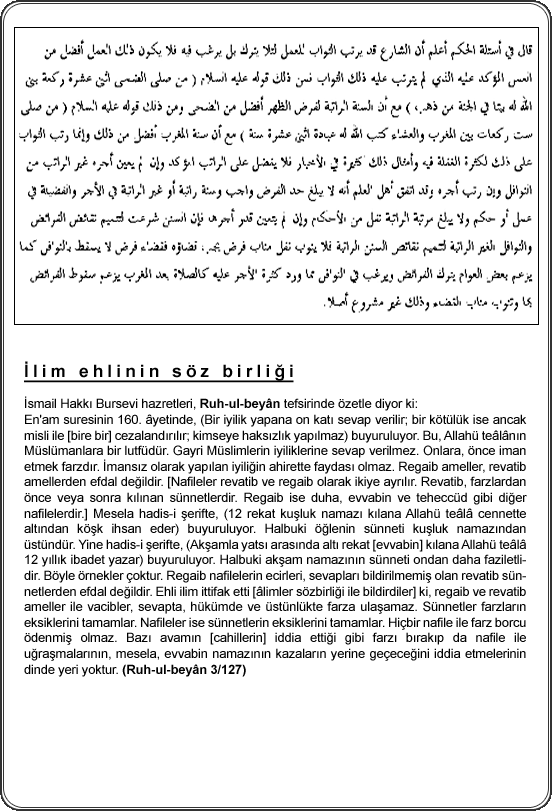
Translation:
Unanimity of Scholars
In Tafsir Ruh al-Bayan, Hadrat Ismail Haqqi Bursawi states in brief:The 160th verse of Surat al-An'am says (what means),
"Whoever does a good deed will receive a tenfold reward. Whoever does an evil deed will be recompensed only with the like of it. None will be treated unjustly." This is a gift from Allahu ta'ala for Muslims. Non-Muslims do not earn rewards (
thawab) for their good deeds because what is obligatory on them first is to believe. A good deed done without faith (
iman) will not be beneficial in the Hereafter. The deeds that are
raghaib are not better than the deeds that are
rawatib. [
Nafila (voluntary)
salats are divided into two: the ones that are
rawatib and the ones that are
raghaib.
Rawatib ones are the
sunnat salats performed before or after
fard salats.
Raghaib salats are the other
nafila salats, such as
Salat ad-Duha,
Salat al-Awwabin, and
Salat at-Tahajjud.] For example, a
hadith-i sharif says
, "Whoever performs 12 rak'ats of Salat ad-Duha, Allahu ta'ala will give him a mansion made of gold in Paradise." However, the pre-
fard sunnat salat of
Salat az-Zuhr is superior to
Salat ad-Duha. Another
hadith-i sharif says,
"Whoever performs 6 rak'ats[
Salat al-Awwabin]
between Salat al-Maghrib and Salat al-Isha, Allahu ta'ala will record for him 12 years' acts of worship." However, the
sunnat salat of
Salat al-Maghrib is superior to
Salat al-Awwabin. Such examples are many. The rewards for
nafila acts of worship that are
raghaib are not better than the rewards for the acts of worship that are
rawatib, whose rewards were not explained. Scholars declared unanimously that
raghaib,
rawatib, and
wajib acts of worship cannot reach
fard [obligatory] acts of worship in rewards, status, and superiority.
Sunnat salats compensate for the deficiencies in one's
fard salats.
Nafila salats compensate for the deficiencies in one's
sunnat salats. No
nafila act of worship can acquit a person of a
fard obligation. It has no place in Islam, unlike what the layman says, to claim that doing
nafila acts of worship will substitute for obligatory acts of worship, such as claiming that performing
Salat al-Awwabin will compensate for one's omitted [
qada]
salats.
(Ruh al-Bayan, Vol. 3, p. 127)




